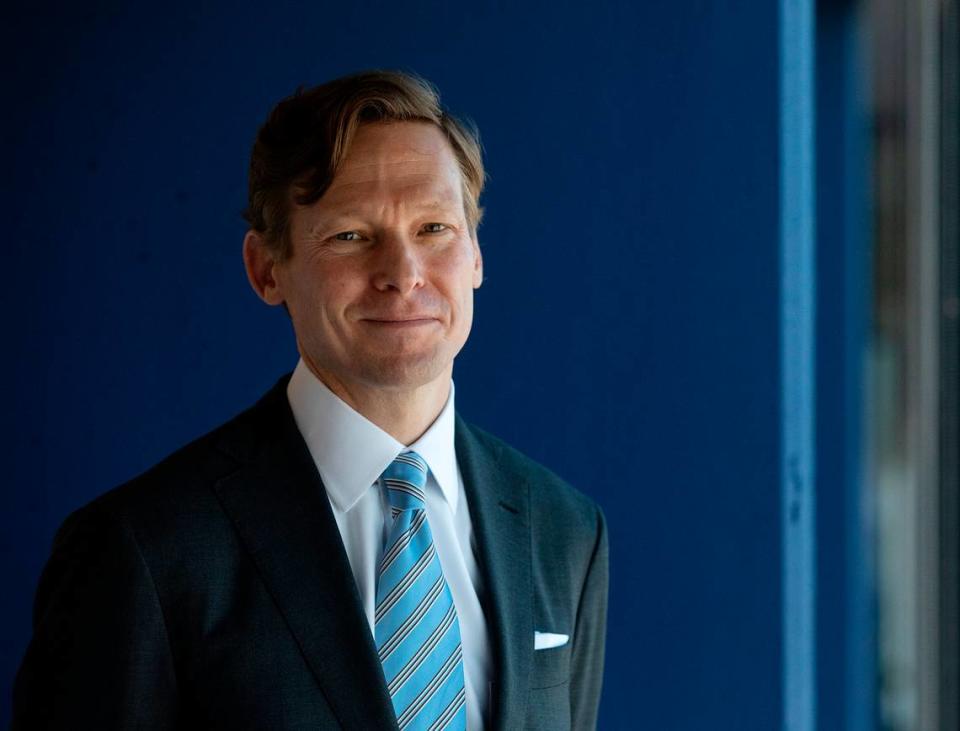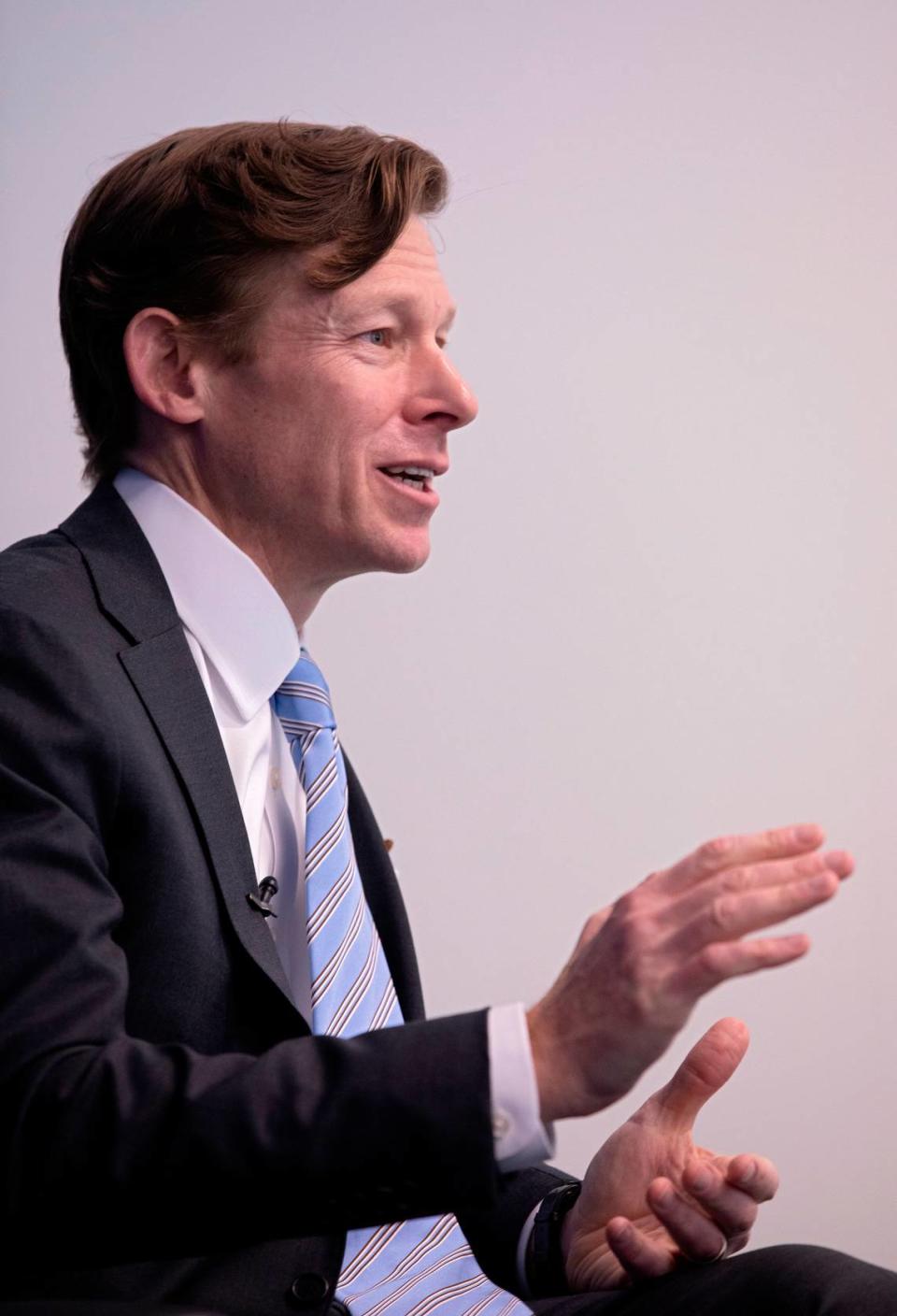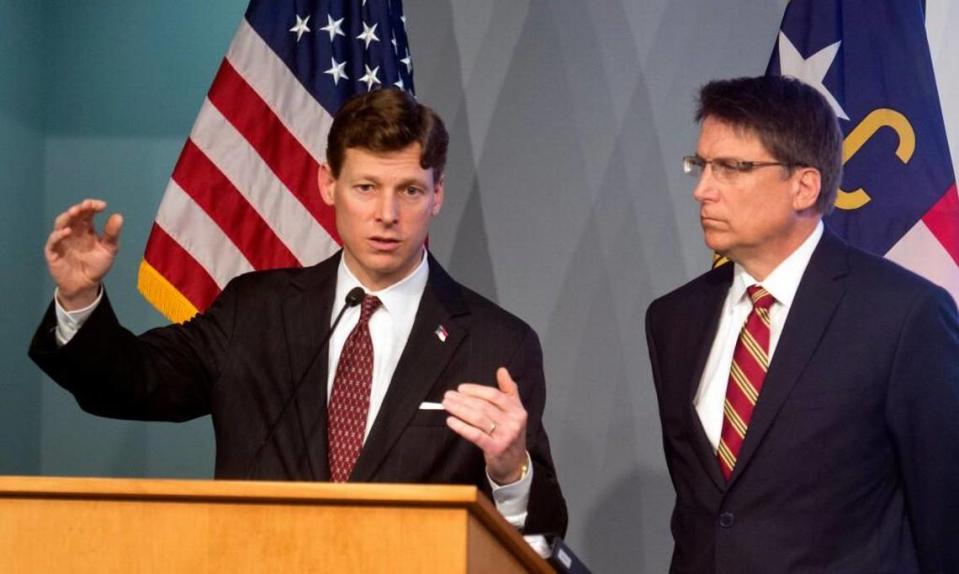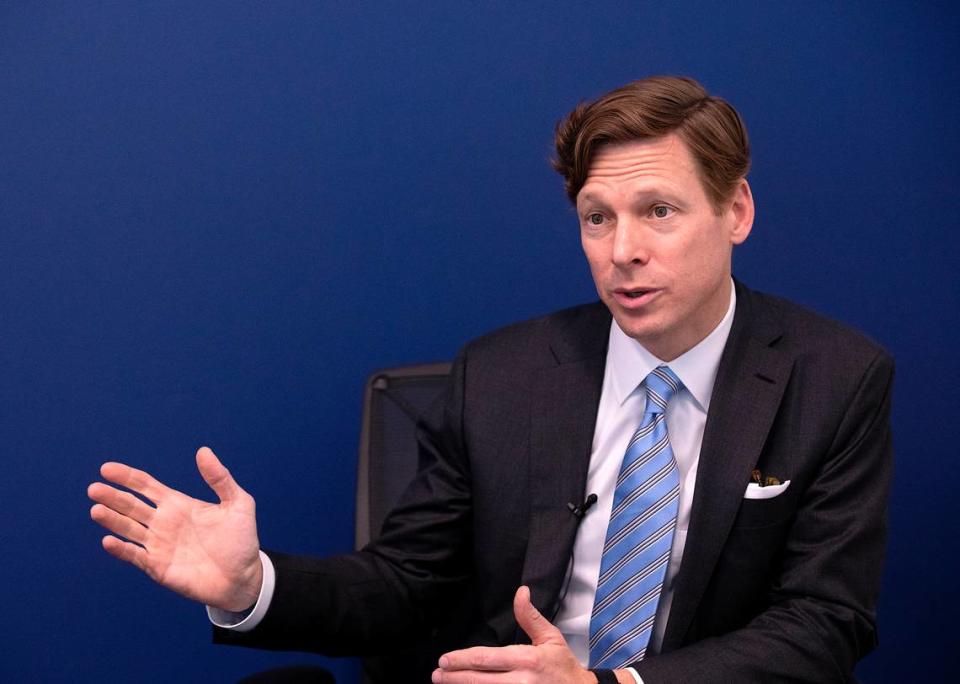Lee Roberts, former McCrory budget director, to serve as interim UNC chancellor
- Oops!Something went wrong.Please try again later.
Lee Roberts, a former state budget director under Republican Gov. Pat McCrory and a member of the UNC System Board of Governors, will serve as interim chancellor at UNC-Chapel Hill after current Chancellor Kevin Guskiewicz departs the university on Jan. 12.
UNC System President Peter Hans on Friday named Roberts to the role. Roberts will resign from the Board of Governors to serve in the role, which system policy requires him to do.
Guskiewicz, who has been chancellor since 2019, was hired Dec. 8 as the next president of Michigan State University.
Roberts, who had served on the Board of Governors since being appointed by the state Senate in 2021, has been a public policy course instructor at Duke University since 2020, but has no experience in university administration. He is an investment manager and the managing partner of SharpVue Capital, a private investment firm, which he co-founded in 2016.
Roberts acknowledged in an interview with The News & Observer Thursday that people may have questions about his qualifications for the job, but said he thinks his skills from the private sector — from leading large, complex organizations, to ensuring staff have adequate resources, to creating a welcoming environment, among others — emulate “what the best chancellors do.”
“Those are the skills I’ve been using my entire career,” Roberts said, while also acknowledging that he “would never claim to be an academic” and has “tremendous respect for what academics do.”
Hans, as system president, holds the authority to appoint interim chancellors when there are vacancies at any of the system’s 17 institutions, though there is not a specific system policy outlining that responsibility.
“That’s been the UNC System’s practice for a long time,” system spokesperson Andy Wallace previously told The N&O. “Appointing interim leadership is considered part of the President’s duties as the chief administrative and executive officer of the University.”
In a Friday news release, Hans called Roberts “a patient leader, a generous listener, and someone raised with the values of public service.”
“He knows how to find common ground on challenging issues, and he brings out the best in everyone around him,” Hans said. “He’s deeply committed to the university, and I’m excited to work alongside him in supporting the great work happening at Carolina.”
Roberts said he was “flattered” to be offered the interim role and fill “a need that the system had,” but did not expressly say whether he would pursue the job on a permanent basis. A search for the university’s next permanent chancellor will begin “in the coming months,” the news release Friday stated.
“No one’s promised me anything other than the opportunity to work hard as interim chancellor,” Roberts said.

Moving from Board of Governors to interim chancellor
Roberts is the second Board of Governors member to become a chancellor within the UNC System in recent years. Neither had professional backgrounds in academia — something that has become somewhat more common in higher education nationally in recent years, notably with Mitch Daniels, the former Republican governor of Indiana who served as president of Purdue University from 2013 to 2022.
Darrell Allison, now chancellor at Fayetteville State University, served on the board before resigning to be considered for the chancellorship. Upon being selected as chancellor in 2021, Allison said he followed protocol during the process and, when he knew he was leaning toward applying, he immediately stepped down from the board, The N&O reported.
Allison, who worked as a senior staff member for the American Federation For Children immediately prior to becoming chancellor, said at the time that it was “somewhat unprecedented” to have a former Board of Governors member named chancellor. But he denied allegations that he was hand-picked by Hans and added at the last minute to a list of candidates to be considered by the university’s Board of Trustees.
Roberts said he understands “the concern” that his moving from the Board of Governors to the interim chancellor role might raise, and the potential perceptions that his position gave him an inside track to the appointment, but noted that such moves are not as uncommon in the private sector.
UNC Faculty Chair Beth Moracco recently told The N&O that it would not be impossible for someone without a background in academia to lead the university, but said “it’d be really difficult” and would pose a steep learning curve to the person selected.
“I understand that there are people who will want to get to know whoever the interim chancellor is, particularly someone coming from outside academia,” Roberts said. “And that means having big ears and spending a lot of time trying to meet as many people as possible, listen to their concerns, try to ensure a smooth transition.”
Roberts said he wants to “do no harm” to UNC as interim chancellor.

Roberts as McCrory’s budget director
Roberts’ appointment as interim chancellor also marks the second time he has been selected for a state job for which he has little formal experience.
When former Gov. McCrory selected Roberts — an unaffiliated voter — as his budget director in 2014, succeeding former Republican legislator and powerful political donor Art Pope, Roberts had worked predominantly in the private banking sector.
“Even though I was familiar with finance and with budgeting in general coming in, there’s an awful lot of specific detail to learn about the state budget,” Roberts said in a 2015 N&O report.
Still, state leaders largely praised his work in that role, with one calling him a “quick study.”
McCrory — who said he was not involved in discussions to select Roberts as interim chancellor — recently highlighted to The N&O Roberts’ work on the Connect NC bond, which allowed the state to borrow up to $2 billion for campus construction and infrastructure improvements at the state’s universities and community colleges.
“Lee was the leader of that effort,” McCrory said.

Serving on the Board of Governors has allowed Roberts to see many of those projects come to fruition on UNC System campuses, Roberts said.
“As we go around to different campuses, almost inevitably, their new project that they’re very proud of, that they show the Board of Governors, is a project that was in that bond package,” Roberts said. “That’s rewarding.”
McCrory said Roberts’ experience in finance and budgeting would be “a tremendous asset” in his new role as interim chancellor.
“The need for all educational institutions to prioritize their spending at a time when there’s going to be challenges in the future is a major attribute of his,” McCrory said. “And he’s got a great relationship with those in the private sector and in the political sector, I think across party lines. He’s just known as a very serious, well-respected person, and he’s a great listener. One of the best listeners I’ve ever been around.”
Roberts resigned as budget director in January 2016, about 16 months after he started. McCrory said at the time that Roberts’ decision stemmed from an opportunity in the private sector that was good for his family.
Roberts said at the time his decision was not connected to an issue with a prison contract, in which a longtime friend and donor to McCrory received an extension on his firm’s contract over the objections of prison officials. Roberts testified to a legislative committee that he believed the extension was handled in an ethical and standard manner, The N&O reported.
Roberts said he plans to work “in a nonpartisan way” as interim chancellor.
“I think to be effective in this role, you need to be able to work with Republicans and Democrats and independents and everybody else,” he said. “And I think that’s what I’ve done in my past roles.”
Connections to Duke
Roberts holds a bachelor’s degree in political science from Duke and a law degree from Georgetown University.
Donning a Carolina blue tie Thursday, Roberts said he was grateful for his time at Duke, which brought him to North Carolina from Washington, D.C., when he was 17 years old. But he said he looks forward to cheering on the Tar Heels in a variety of sports, from basketball to football to field hockey.
“I guess I’m proof that even Blue Devils can eventually see the light,” he said.

John Preyer, chair of the UNC Board of Trustees, said in a statement provided to The N&O that he welcomes Roberts “to the greatest public university in the world and to the very best shade of blue.”
Roberts cited college athletics as a potential challenge he may have to address in his new role, saying that he and others in leadership roles “will have the challenge of making sure that when the dust settles, Carolina is better off.”
In an era of athletic conference realignment — one that saw the Atlantic Coast Conference this year vote to add three new schools to its league, despite objections by UNC and two other schools — Roberts said he feels confident he can prioritize the needs of UNC, despite his ties to Duke.
“This will be my full-time job and my 100% commitment,” Roberts said. “My fiduciary responsibility, which is something I understand very well from what I’ve been doing in my career up until now, and the interests of Carolina will be the only consideration.”
Asked about other challenges he might have to confront as interim chancellor, Roberts said “free speech is obviously a huge issue right now.”
“Carolina is obviously a little bit different than the universities who were in front of Congress last week,” Roberts said, referring to the testimony of three private college presidents regarding antisemitism on their respective campuses. “As a public university, we’re bound by the First Amendment. Obviously free speech is an important value of our university, and should be at every university. It should be at the core of what a university does.”
Roberts said he is “all for” the development of the School of Civic Life and Leadership, which the UNC Board of Trustees directed the university to accelerate earlier this year and has been a point of contention among faculty ever since.
Roberts said he hopes to leave the university better than he found it.
“If you care about higher education, if you care about the future of the state and if you care about public service, you have to care about what happens to Carolina. We don’t have a more important institution in the state than Carolina,” Roberts said.
“I think the future belongs to North Carolina. I think we’ve got the best state in the country — an interesting, dynamic, fast-growing place to live and work and raise families, and Carolina’s integral to that future. That’s what makes this so exciting.”

